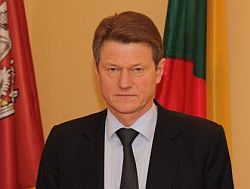EU – Baltic States, Legislation, Lithuania
International Internet Magazine. Baltic States news & analytics
Friday, 19.04.2024, 12:24
Lithuania faces public condemnation by Council of Europe over Paksas case
 Print version
Print version |
|---|
| Rolandas Paksas. BC. |
Donatas
Murauskas, a representative of the Lithuanian government, says the Council of
Europe's Committee of Ministers will discuss this issue on December 4-6.
"The implementation of the Paksas case will be publicly discussed
during this sitting. And it’s very likely that a Committee of Ministers
resolution against Lithuania will be proposed for the first time,"
Murauskas, head of the Ministry of Justice's Division of Representation at the
European Court of Human Rights, told.
"It would constitute an international sanction, a political document
meaning that Lithuania does not meet part of its international commitments
arising from its Council of Europe membership. It would have a strong affect on
Lithuania's reputation," the lawyer said.
Earlier in the day, a fresh attempt to lift a lifetime ban on Lithuania's
impeached former president Rolandas Paksas to run in elections, as ordered by
the European Court of Human Rights, fell through.
Seventy-eight members of the Seimas backed a constitutional amendment
allowing an impeached person to stand in elections, 16 votes short of the
necessary 94 for the vote to pass.
Fifteen lawmakers voted against the amendment and four abstained.
A constitutional amendment must be voted on twice by the Seimas, with an
interval of at least three months between the votes, and requires a two-thirds
majority, or 94 votes, to be adopted.
The Seimas several years ago tried to pass constitutional amendments that
would have opened the way for Paksas to run in elections, but failed to muster
enough votes.
The latest amendment, submitted by the ruling bloc, would have allowed an
impeached person to be elected president or a member of the Seimas ten years
after his or her removal from office.
The amendment was tabled to comply with the Strasbourg-based court's 2011
ruling that the lifetime ban on Paksas to stand as a candidate in
elections was disproportionate and ran counter to the European Convention on
Human Rights.








 «The Baltic Course» Is Sold and Stays in Business!
«The Baltic Course» Is Sold and Stays in Business!

